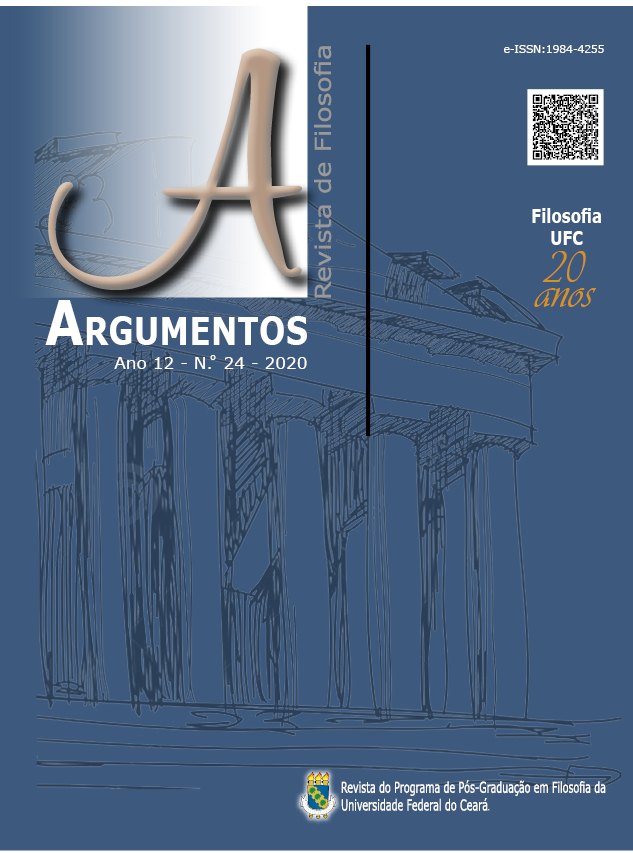Derecho a equivocarse: excusas e inocencia epistémica
DOI:
https://doi.org/10.36517/Argumentos.24.9Resumo
Si un sujeto S atribuye conocimiento ignorando evidencias disponibles, entonces S no será culpable de tal atribución y, por lo tanto, no será epistémicamente irresponsable, cuando: (a) no es consciente de su propia ignorancia y (b) quienes lo juzgan, explícita o implícitamente, se ponen en el lugar de él y reconocen que no serían conscientes de su ignorancia. En este escrito se defenderá la aplicación de semejante principio, no sólo en lo que respecta a las atribuciones de conocimiento en contextos ordinarios, sino también en lo que respecta a los contextos más exigentes.
Downloads
Referências
Blome-Tillmann, M. (2013). Knowledge and implicatures. Synthese, 190(18), 4293-4319.
BonJour, L. (2010). The myth of knowledge. Philosophical Perspectives, 24(1), 57-83.
Conee, E., & Feldman, R. (2004). Evidentialism: Essays in Epistemology. Oxford: Clarendon Press.
Davidson, D. (1980). Essays on Actions and Events. Oxford: Clarendon Press.
Feldman, R. (1981). Fallibilism and Knowing That One Knows. The Philosophical Review, 90, 266-82.
Goldman, A. (1976). Discrimination and perceptual knowledge. Journal of Philosophy, 73, 771-791.
Goldman, A. (1986). Epistemology and Cognition. Cambridge: Harvard University Press.
Grice, P. (1975). Logic and Conversation. In e. b. Morgan, Syntax and Semantics, Vol. 3, Speech Acts (pp. 41-58). New York: Acedemic Press.
Hawthorne, J. (2004). Knowledge and Lotteries. Oxford: Clarendon Press.
Hazlett, & Allan. (2010). The myth of factive verbs. Philosophy and Phenomenological Research, 80(3), 497-522.
Heathwood, C. (2009). Moral and Epistemic Open Question Arguments. Philosophical Books, 50, 83-98.
Hetherington, S. (2013). Concessive knowledge-attributions: fallibilism and gradualism. Synthese, 190(14), 2835-2851.
Kvanvig, J. (2011). Against Pragmatic Encroachment. Logos & Episteme, 2(1), 77-85.
Lewis, D. (1996). Elusive Knowledge. Australasian Journal of Philosophy, 74(4), 549-567.
Loader, P. (2012). The epistemic/pragmatic dichotomy. Philosophical Explorations, 15(2), 219-232.
Pedace, K. (2017). Mente y Lenguaje. Buenos Aires: SADAF.
Schaffer, J. (2004). From Contextualism to Contrastivism. Philosophical Studies, 119(1), 73-104.
Schaffer, J. (2012). Contrastive Knowledge Surveyed. Nous, 46(4), 675–708.
Stanley, J. (2005). Knowledge And Practical Interests. Oxford: Oxfiord University Press.
Sullivan-Bissett, E. (2015). Implicit bias, confabulation, and epistemic innocence. Consciousness and Cognition, 33, 548-560.
Vavova, K. (2018). Irrelevant influences. Philosophy and Phenomenological Research, 96(1), 134-152.
Downloads
Publicado
Edição
Seção
Licença
Copyright (c) 2020 Argumentos - Revista de Filosofia

Este trabalho está licenciado sob uma licença Creative Commons Attribution 4.0 International License.
Autores que publicam nesta revista concordam com os seguintes termos (SOBRE COPYRIGHT E POLÍTICA DE ACESSO LIVRE):
1. Autores mantém OS DIREITOS AUTORAIS concedidos à revista OU Direito de Primeira Publicação, com o trabalho simultaneamente licenciado à Atribuição de Licença Creative Commons (CC BY) que permite o compartilhamento dos trabalhos com reconhecimento de autoria e publicação inicial nesta revista.
2. Autores têm permissão para aceitar contratos, distribuição não-exclusiva da versão do trabalho publicada nesta revista (por exemplo: publicar no repositório institucional ou como um capítulo do livro), com reconhecimento de autoria e publicação inicial nesta revista.
3. Autores têm permissão e são estimulados a publicar e distribuir seu trabalho on-line (por exemplo: em repositórios institucionais ou em sua página pessoal) mesmo durante o processo editorial, haja visto que isso pode aumentar o impacto e citação do trabalho publicado.

Deprecated: json_decode(): Passing null to parameter #1 ($json) of type string is deprecated in /var/ojs/html/plugins/generic/citations/CitationsPlugin.inc.php on line 49



.jpg)










._._3.png)
1.jpg)
._._._.png)
